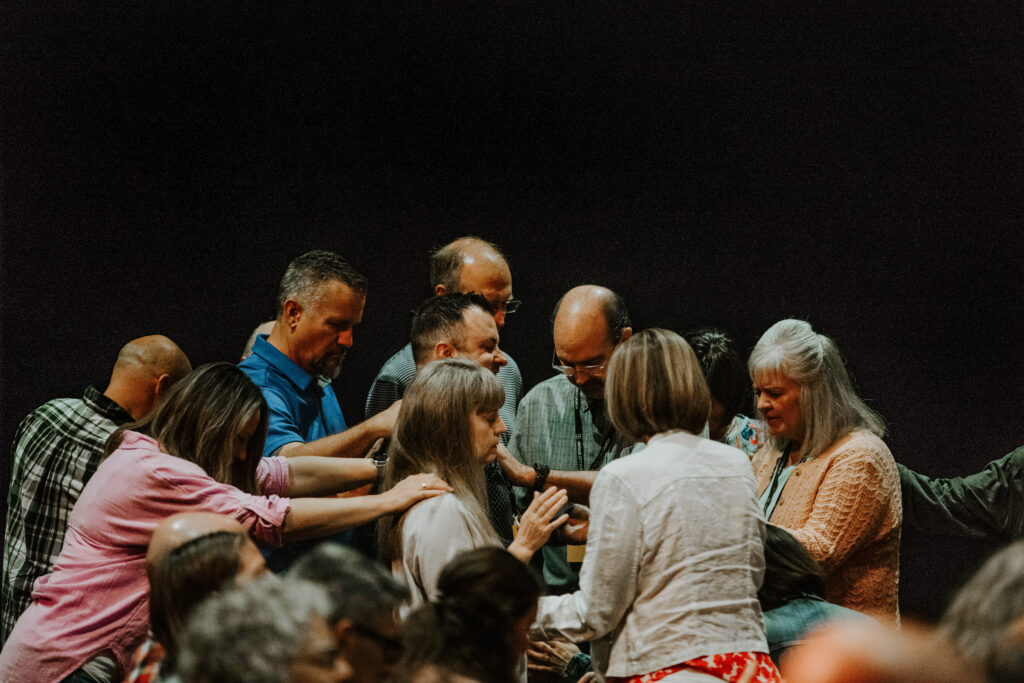Refusing the rights we believe we deserve, being willing to suffer for the benefit of others, and laying down our lives in in servics–this is the way of Jesus.
June 15, 2023





Speaker: Greg Sanders
Passage: Romans 15:5-7
Don’t Let Your Attitude Govern Your Life
Grab your Bible. We’re going to be in Romans chapter 15.
In our study of Romans, every once in a while, there are words that will jump out. One of those we looked at was the judgment seat. We talked about what it looks like as a people to live with an awareness that we’re going to stand before the Lord in judgment. Sometimes that freaks people out because they’re like, what about grace?
I don’t know about you, but I’m banking on grace when judgment happens. That doesn’t mean I want to live with an arrogance that acts like it doesn’t matter. That’s really what Paul’s teaching. We come up with another idea here in Romans 15:5, which will say, “May God, who gives this patience and encouragement, help you live in complete harmony with each other, each with the attitude of Christ towards the other.”
I want to focus our attention on a very specific idea that comes out of this verse. The thing Paul asserts in these verses is that our native attitude is not what we are to allow to govern how we live. Our native attitude, our natural attitude, is not supposed to govern how we live. Let that one sink in for a minute.
There are times when I’m fairly strong in my opinions because I think them through and I hold them for a reason. We call that being opinionated. We call that being strong. We call it being driven. Whatever you want to call it — stubborn.
They’re often on our attitudes. One of my favorite quotes from John Maxwell is simple: “Your attitude will affect your altitude.” In his book, Winning With People — this is where that quote comes from — he talks about the way a pilot will push the nose of the plane up through all the different gears they have available to them and that they’re controlling the attitude of the plane to get it to the altitude it’s supposed to be.
If you’ve ever been on a plane, you’re grateful that they change that attitude when they get to the right elevation. Because otherwise, you just go to the limits of the atmosphere where the plane can take you, and then it crashes, and that would be bad. Your attitude will affect your altitude.
I think it’s just really simple to consider this, the way we live towards others — the perspective, the attitude, the mindset — really controls where we go in life. I want to explore that this morning. I want to make some observations out of just this simple verse five. I’m going to read it again, “May God, who gives this patience and encouragement, help you live in complete harmony with each other, each with the attitude of Christ Jesus towards one another.”
What patience and encouragement? If we go back to verse four, it says, “Such things were written in the Scriptures long ago to teach us. They give us hope and encouragement, as we wait patiently for God’s promises.”
He’s talking about the Scriptures and how they were written, and they are for us to help hold us in the right perspective in life. I’d say it this way: we are going to go through things in life where the Lord intends that we study the Scriptures, we learn from the Scriptures, we grab principles out of there, and they give us the courage to keep going.
Paul says something in verse five that I love. The first observation I want to make is that God is the sole source of the kind of patience and encouragement that will help you live in harmony with others.
That kind of patience, that kind of encouragement, the kind that will help you live in harmony and peace with other people, only comes from God. Why is that important? Patience is the ability to hold on, to hang in there, and to trust the outcome will come together. How many have met someone in the last week that needs patience?
How do I know? Because they’re freaking out. They’re worried about everything. They’re not sure what’s going to happen. They just get so spun up in their head that they start to lose any kind of peace. Has anybody met anybody like that? Anyone sitting next to somebody like that. Don’t raise your hand.
The Voice Of Encouragement And Patience
Encouragement is the voice of another to keep our hope and our belief up. It’s somebody coming alongside you and just saying, hey, you got this, you can do this. Every once in a while I get up in my head, and my wife will grab my face and say, “Hey, you’re a good man, relax.” And everything in me wants to be like, “Don’t say that to me.” But the truth is, it makes me want to cry. It feels good.
These are vitally necessary gifts in the climate of life we live in right now. How many would agree with me, it’s really easy to get discouraged and get impatient right now. Humanity and the world around us have to have these to survive.
I think impatience and frustration or discouragement are incredibly dangerous because they cause us to step into pursuits we were never intended to take. When you and I get impatient, when we get discouraged, we react. Living reactively is usually dangerous. Without patience, we get frustrated, we quit the process or we forfeit the reward because we just don’t have the staying power to succeed.
It’s in our nature, whether it’s a marriage, a job, or fiscal difficulty. You and I are going to face things in life where we have to have the patience to make it.
Without encouragement, we get discouraged. I think discouragement is one of the key things the enemy uses against people of God. I think he loves to dwell in discouragement. We cannot get discouraged if our eyes are on the Lord. The only time we can get discouraged is if we start looking at our situation. If your attitude affects your altitude and my attitude is now on my situation, he’s won.
When we lose courage, we settle into a fear-ridden life without the gumption and the tenacity to stay in the fight. I want us to just consider the truth that Paul reveals in this verse. These qualities that we have to have to make it are not something we can muster up. You can’t just decide, I’m gonna have patience. I’m gonna have courage, even if you want to.
They’re not found because we decide to engage in the right self-help programs. I think self-help programs are great. I think therapy is great. But these things don’t come out of those. Based on what Paul teaches, these are only available supernaturally. Meaning they’re only found with Him.
While that helps, the problem all too often is that we fail to go sit with the Lord to gain these things and then we wonder why we’re impatient and discouraged. Paul’s statement is so clear. God can give it, but we have to go get it. My question for us is, do we have the discipline when we’re impatient and when we’re discouraged to shut our schedules down and go sit with the Lord until He gives us courage and He gives us patience?
Do we take it seriously enough? Do we see impatience and discouragement as really dangerous enemies to everything about faith? Of all this belief and this hope and this trust when we know He’s called us to stick to it. He’s called us to keep our eyes on Him. We’ve got to keep going.
Then we get so up in our heads that we walk away from God’s purpose and plan. Some of us have walked away from marriage. We’ve walked away from jobs all because of discouragement and impatience when all the time the answer was available. Because He gives it.
Living In Complete Harmony
The second observation is: complete harmony is His desire for how we interact. How many could raise their hand and say I’m in complete harmony with everybody in my life right now? How many have just decided that’s never going to happen? How many are just liars and don’t care?
Complete harmony is His desire. I want us to consider the places of conflict and turmoil in our relationships. Consider with me that He, the king, our God, is not the author of those places of conflict. His authorship, according to Paul, says I want complete harmony in your life.
What is complete harmony? It’s to be of the same mind. We tend to hear the phrase “of the same mind,” and we instantly consider the word “agreement.” That word does not mean “to be in agreement,” as in you agree on everything. It means “to be of the same mind.” Paul’s not saying we have to agree on everything. He’s saying we have to align to the same thing.
According to First Corinthians, we are to align as people to the mind of Christ. How do you get the mind of Christ?
I am leading you to an intentional conclusion. I am walking you to the edge of a cliff and will push you over it. According to 1 Corinthians 2, we already have the mind of Christ. It was given to us the moment we gave our lives to Him. So if I have the mind of Christ, what stands in the way of this same-mindedness? Attitude. Your attitude stands in the way of you walking in the mind of Christ.
Learn The Attitude Of Christ
Observation number three. “May God, who gives this patience and encouragement, help you live in complete harmony with each other, each with the attitude of Christ Jesus towards the other.” The third observation is really simple. It’s not rocket science. Every believer is to learn the attitude of Christ.
What is the attitude of Christ? It’s not just some esoteric thing that we declare. Philippians chapter two is where we have to go to study it. So if you have your Bible, let’s go to Philippians chapter two. Verse five says, “Your attitude should be the same that Christ Jesus had.”
The word attitude is the word phroneo in Greek and it means “to consider,” “to think,” or “to regard.” It means mentality or mindset. The way you consider things, the way you think, the way you regard other people, and the way you regard things — your mentality or mindset — is to be the same that Christ Jesus had.
Paul uses an imperative in Greek, which means it’s a command, not a suggestion. Paul is not saying, “Hey, it’d be really good if you believers had the same attitude that Jesus had. But you can have your own if you want.” No, he makes a commandment, which means to fail in it is disobedience. To succeed in it is obedience.
Your attitude should be the same–will be the same is really how we should understand that. We are to be of the same mindset as Jesus. That mindset is to affect every aspect of our lives.
I want to state the obvious here. This means we are to choose the way He considers others and the way He thinks about things regarding Himself. We’re to adopt his mentality and His mindset in favor of our unique perspectives.
I want to give you a newsflash, the day you came to the King and you gave your life to Him, His mindset became yours, regardless of whether you agree or disagree. You do not have the right to hold a perspective that He doesn’t support. I don’t care if it’s about politics. I don’t care if it’s about food. Our job is to allow His mind to control ours. That’s what we’ve been commanded to do in the Scriptures.
I’m not sure I could stress this enough. Your attitude is the result of your perspective and mentality. It is controllable and shapeable. It’s a lie from hell that the way we see the world is just who we are. The way you see the world is not just who you are. It may be who you’re allowing yourself to be, but it’s not who you are.
We are both called and invited — actually commanded — to choose His way of seeing the world. His way of regarding the world. His way of approaching the world. What was this mindset? What attitude did Jesus live with? What was the way of Jesus? I love that phrase, the way of Jesus.
“Though He was God, he did not demand and cling to His rights as God.” This is Philippians two again. We’re working from verse five. This phrase, “Though He was God,” is morphe theou in Greek. Paul’s intent in this phrase is to clearly reveal that Jesus was equal with and of the same essence as God. Equal plane. He was God, yet that identity did not inform how He lived. What a crazy thought.
Consider that attitude that Jesus models a posture for us to learn from. Our identity is derived from the Father. He’s God. Therefore He, by His existence, defines our identity. We are His. When I step into that place where I let Him define me and create my identity, all of a sudden, all the things the world is telling me and using to identify me fall away.
The moment I believe He defines me, I have to believe what He says about me defines me. What He says about me identifies me. Therefore, I don’t get to have an identity that’s contrary to what He says, because He’s the one defining my identity.
If you say, “I’m an angry person,” you can’t be an angry person when He defines your identity. Righteousness, peace, joy in the Holy Spirit — there’s all these things love, joy, peace, patience, kindness — I can’t hold on to things that aren’t Him. Regardless of whether or not I feel them, because He identifies me. My identity is in Him, not in me.
The Mindsets Of Jesus
So what are these mindsets? Number one, Jesus rejected the entitlement of position. He did not demand or cling to His rights. The word is isos here, and it literally means the sense of oneself being robbed or at a loss. To rephrase that, Jesus didn’t fight for His rights. He was unwilling to let His status inform His function. In other words, Jesus never said you can’t treat me like that. Do you know who I am?
I’m just going to let you figure out all the places that could be applied. Entitlement is the condition of demanding what you are due. It is the state of believing you are due something. It’s the reality of refusing to go low. Entitlement offends my humility. Jesus refused entitlement because of His humility.
We know He became a servant. I would love to submit a simple fundamental idea. The first step to becoming a servant in the Kingdom is to lay down your rights. Do you know the problem with rights? You’re due them. They’re called rights because they’re rightfully given to you. Yet Jesus lays His down as an example for us that part of living in complete harmony with others is the willingness to go low and not worry about it because we’re identified by Him and we’re secure in who we are, because of who He is.
Paul goes on and says He made Himself nothing. Mindset number two, Jesus willingly embraced personal loss for the benefit of others. He made Himself nothing. The word means “empty.” Ekenosen, which means “to empty” or “divest” in Greek. He chose to empty Himself of His native rights for the express purpose of what was needed for others.
I don’t want to take us too tangential. But I just want to pause here and discuss something that I think is central to this conversation. Was Jesus able to carry this attitude we’re talking about because of His divinity?
Why does that matter? If Jesus did this through some different standard than humanity, if He was a supernatural Thor-like character where everybody else can do a 36-inch box jump and Thor jumps like 36 stories, if that’s how He did this, then we’re never going to be capable of following in His footsteps.
This false understanding of Jesus has plagued the church for a couple of thousand years. There’s a group of early Christians called the Monophysites. Mono means “one” and physite means “nature,” so we call them “one naturists.” They argued that Jesus was merely a God who had adopted an exterior body or figure of a human being, but He wasn’t fully man. He wasn’t fully human. The early church condemned that belief as a heresy because of two things. One, it denied that Jesus had truly adopted our nature and two, as believers, it denied that we could be capable of following in His footsteps.
You see, it would be easy for me if I said, “You know what? Jesus did this because He was divine. I don’t do it because I’m not.” And then the rest of my life, my answer could be, “I’m not God. Sorry, I got stuff.” That would strip away from me any responsibility to say that He is my living example. He’s my type. He’s my shadow. He is the one I’m called to follow. I am to make my life like His.
If He was somehow imbued with a different-than-human essence, having greater control of His mind and His emotions because of His divinity, the miracle of His life was just less. I believe that idea is really dangerous for you and me.
Without even thinking about it, we give ourselves a pass to never step into His standard. Paul states that He, being equal with God, of the same essence, laid aside that divinity and willingly chose the fullness of humanity wherein He was in the same form we are.
Pastor Dustin came across something in research, and He and I geeked out on it. See, the Gnostic Greeks of Paul’s day had a concept that the human soul was nailed to or pinned onto human flesh. It was just this temporary thing that was pinned on.
Because of that belief, their view was the soul and the body are not interconnected. They’re not even really of the same concern. So whatever the body does, it’s just the body doing it. The soul is going to be okay later on. They would espouse that salvation and death were synonymous. The moment you died, you were saved. That was the moment the soul was free from the burden of the body.
I want you to think about something that came across my mind as we were studying this week. Jesus laid aside His divine nature to embrace and become human so you and I could lay aside our sinful nature and choose to embrace His divine nature. That’s the exchange of the Gospel.
Paul’s message is simple. If He could choose to lay aside His divine nature, we can choose to lay aside our sinful nature. The laying aside of His nature was rooted in an attitude. He took the humble position of a slave and appeared in human form, and in human form, He obediently humbled Himself further by dying a criminal’s death on the cross.
Mindset three, He stepped into the humility of a slave. The word is doulos. We’ve anesthetized the term. We’ve turned it into something akin to an employee. It was absolutely not an employee. Paul’s writing to Greco-Roman culture, and in this culture, this economic superpower was built on slavery. He’s using a term that was intended to cause them shock and awe. He’s writing to a Roman culture with a term that, as they read it, they would have been shocked. That was His whole point.
Doulai — which pastor Dustin so eloquently educated me on — is the plural form of doulos. Doulai were property. There was a term in Roman culture for them called instrumentum vocale. It loosely translates into English to “talking tools.”
Can you imagine walking out in the garage and your hammer could talk to you? You’d be like, “Yeah, that’s the instrumentum vocale. It’s my talking tool. I hammer, and it tells me all the time you missed the nail. It’s just the funny thing.”
That’s how they viewed these people. Doulai had no rights. They could be treated in any way their owner wanted. Killed at will and sold at will. Roman archaeologist Ivana Protic will state it this way, “The institution of Roman slavery was brutal. Slaves were sold like animals and physically and sexually violated. They worked in extreme conditions. They were mocked. They lived in constant fear and feeling of inferiority. They would sleep in barn-like constructions and had little to eat. They wore chains around their feet that not only burdened them but reminded them of their destiny without freedom. They were consumer goods who would work until death.”
The historian Seculius would write it this way of Roman slaves. “They, themselves, wear out their bodies both day and night in the diggings under the earth, dying in large numbers because of the exceptional hardships they endure. For no respite or pause is granted them in their labors. But compelled beneath the blows of the overseers to endure the severity of their plight. They throw away their lives in this wretched manner, although certain few of them can endure it by virtue of their bodily strength and their persevering souls. They suffer such hardships over a long period of time indeed, death in their eyes is more to be desired than life because of the magnitude of hardship they must bear.
Here’s a little factoid. Do you know the Catholic turn collar the priests wear? Do you know why they started wearing it? It was to be a reminder of the way the doulai were kept. They had chains around their neck. It was to be a constant picture that I am a slave to Him. I have mad respect for it now. I didn’t before. I just thought it was hard to breathe with one on.
Jesus stepped into the mental posture of a slave. He chose to live as a slave to the will of His Father, even when that posture led Him to death. The intent of Paul’s language here is to reveal that Jesus not only assumed the mental posture of a slave, but he also died a slave’s death. Crucifixion was reserved for slaves.
Why does all this matter? Paul is trying to teach us what living with the attitude of Jesus looks like. He’s working to show us what it will take to actively live in complete harmony with those around us. It means we follow the pattern of Jesus. We refuse the entitlement we believe we deserve. We become willing to suffer for the benefit of those around us. We lay down our lives, choosing a life of serving, with no promise of benefit.
Surrender Completely To God
Church, this is the way of Jesus. It is a life of sacrifice and a life of surrender. Perhaps this life communicates something to the world around us that we don’t understand. Perhaps this is the life that causes them to go, “Wow, we know them because of the way they love each other. They’re just so servant-hearted, willing to lay down their pride, lay down their frustrations, and lay down their entitlements. They value unity more than everything.”
Let’s take it out of the context of the people of God. Let’s put it in the context of our homes. What do our homes look like if we adopt this mindset toward each other? What happens if I wake up every day and I look in the mirror and go, “Yey, you are doulos to Him. Because of that, you serve everybody around you. Period. You lay your life down. When you’re wronged, you shut up because it doesn’t matter. Because you’re here to serve.”
It’s not lost on me how lousy this message is. Nothing about this is fun. I don’t think that was His concern. I think His concern was that we would transform the world around us by living like He did.
Benediction And Closing Prayer
Church, this isn’t a belief system. This isn’t a religion. This is a bunch of people emancipated by a king, invited to live like the King.
He’s not one of the many gods out there. According to what Paul teaches in Colossians, He holds the cosmos together. The stars stay where they’re at because of Him. At a subatomic level, creation is held together by Him. That is what Paul teaches. There will come a day when every knee will bow and every tongue will confess and people will wake up and go, “Oh, you weren’t like Buddha at all. You’re completely God.”
I don’t know about you, but I don’t want to stand before Him someday and have Him look at me and say, “Greg, what part of My life did you not get? What part of being a servant did you not get? What part of doulos were you not willing to walk in? Why son? You thought you were better than Me? You thought you were more capable than I am? Why wouldn’t you take My example? Why wouldn’t you carry My image?”
Do you want to stop playing church? Put on the mindset of Christ.
Jesus, we love You, we honor You. My deep hope is that we elevated You and who You are to enough of a moment where we start to come to grips with the fact that living like Him is going to take all of me. I have to die to myself and put on Christ.
Lord, my goal is not shame. My goal is just a course correction. That we would step into this model of You and the way You lived and it would become the way we live.
Thank You for the scriptures for their ability to transform us and coach us and challenge us. We love You and we honor You, in Jesus’ name. Amen.
Leave a Reply Cancel reply
the vintage weekly
News, updates, and events sent directly to your inbox every Thursday morning.
Stay up to date with what is going on at Vintage by subscribing to the Vintage Weekly - our weekly newsletter - and downloading the Church Center app. These resources enable us to keep you updated of upcoming events, opportunities, and alerts such as weather cancellations.
SUBSCRIBE TO VINTAGE WEEKLY
DOWNLOAD CHURCH CENTER APP
©2024 vintage city church All Rights Reserved
designed BY Amanda Doherty press, llc
back to top
get the news
Subscribe to the Newsletter
About
Statement of Faith
Our Team
Photo & Video Policy
Prayer Request
Capture Your Miracle
Find us
1501 Academy Court, #101
Fort Collins, CO 80524
970-779-7086
info@vintagecitychurch.com
Thank you for submitting your message. We will be in touch shortly.
